Table des matières
Qu'est-ce que le marketing de réputation ? Boostez votre entreprise en 10 étapes [2025]
Après Coca-Cola et Pepsi, Red Bull est la marque de boisson la plus reconnaissable et la plus précieuse au monde. Au cours des 30 derniers jours, elle a été mentionée en ligne plus de 40 000 fois, touchant près d'un milliard de personnes ! Quel est le secret du succès exceptionnel de Red Bull ? La réponse réside dans le marketing de la réputation.
Résumé rapide :
- Le marketing de la réputation consiste à promouvoir une marque, une entreprise ou une personne. en utilisant des éléments tels que les avis positifs, les témoignages de clients, les évaluations, la preuve sociale, le contenu généré par les utilisateurs sur les médias sociaux, et bien d'autres choses encore, pour instaurer la confiance et attirer de nouveaux clients.
- Il s'agit de mettre en valeur les commentaires favorables tout en gérant les perceptions en ligne pour créer une image de marque forte et crédible.
- Le marketing de la réputation se distingue du marketing traditionnel par se concentrer sur la promotion d'un retour d'information positif et s'aligner sur les valeurs fondamentales de la marqueContrairement au marketing traditionnel, qui se concentre sur le message de l'entreprise.
- L'objectif ultime du marketing de la réputation est de en faire un avantage concurrentiel.
Tout le monde vise une excellente réputation.
Pas de surprise !
Il n'y a rien de plus agréable pour un propriétaire d'entreprise que de lire toutes ces bonnes critiques en ligne et tous ces éloges sur la réputation de sa marque.
Malheureusement, les critiques négatives arrivent même aux meilleurs d'entre nous. Mais il existe de nombreuses façons de transformer les commentaires négatifs en bonnes choses et de renforcer le contenu positif de la marque.
Dans cet article, vous apprendrez tout sur la stratégie de marketing de la réputation en ligne :
- Comment l'utiliser à votre avantage
- Outils essentiels
- Exemples concrets
- & bien plus encore !
Bonne lecture !
Qu'est-ce que le marketing de réputation ?
Le marketing de la réputation fait référence à la effort stratégique visant à façonner et à influencer la façon dont les autres perçoivent une marque, une entreprise ou un individu.
Elle fusionne la gestion de la réputation et le marketing de la marque.
Cela permet de s'assurer que la marque est perçue de manière positive et que sa réputation positive est mise à profit dans les efforts de promotion.
À l'ère du numérique, où :
- L'engagement des clients est essentiel
- Les consommateurs s'appuient fréquemment sur les avis en ligne
- Les gens consultent les témoignages avant d'acheter ou de choisir un service
Le marketing de la réputation devient crucial pour les entreprises de toutes tailles !
Boostez votre marketing de réputation avec Brand24 !
Quels sont les efforts de marketing de la réputation ?
- Répondre aux critiques négatives et aux commentaires des clients.
- Partager le contenu positif de la marque sur les médias sociaux.
- Toutes les activités de relations publiques telles que les interviews dans les journaux locaux ou les collaborations avec des marques de votre secteur d'activité.
- S'occuper de l'optimisation des moteurs de recherche et de ce qui apparaît lorsque quelqu'un tape le nom de votre marque sur Google.
- Disposer d'une stratégie de marketing de la réputation préétablie avec des actions clés pour Crises de prix.
Ceci étant dit, passons à l'action !
Vous vous demandez probablement comment créer une stratégie efficace de marketing de la réputation qui peut être mise en œuvre pour améliorer la réputation de votre entreprise.
Voici mon guide sur la création d'une stratégie solide de marketing de la réputation :
Comment créer une stratégie de marketing de la réputation pour votre entreprise ? 10 étapes
Une réputation solide est un atout marketing précieux qui peut favoriser la croissance de l'entreprise et la confiance des clients.
Voici ce que vous devez prendre en compte lors de l'élaboration de votre stratégie de marketing de la réputation :
01 Vérifier la réputation actuelle
Avant de commencer toute planification, vous devez procéder à un audit approfondi de la présence et de la réputation en ligne de votre marque actuelle. D'accord, mais comment procéder en pratique ?
Le moyen le plus pratique et le plus efficace est d'utiliser des produits appropriés. outils de suivi des médias. Pourquoi ?
Parce que ces outils offrent des fonctionnalités complètes qui vous permettent de vérifier de multiples indicateurs de réputation en temps réel, vous permettant de comprendre ce qui joue en votre faveur (et ce qui ne joue pas en votre faveur).
Je vais vous le montrer avec l'exemple de Brand24, le leader du marché de l'énergie. surveillance des médias l'outil. J'apprécie ce logiciel pour ses Fonctionnalités basées sur l'IA, UX convivialeet le suivi des mention à partir de sources multiples:
- Les plateformes de médias sociaux comme Facebook, Instagram, X (Twitter), YouTube, TikTok, LinkedIn, Reddit, Twitch et Telegram ;
- Sites d'information, blogs, podcasts, plateformes vidéo, bulletins d'information et autres sites web ;
- Sites d'avis en ligne (TripAdvisor, Yelp, Booking.com, App Store, Google Play et Trustpilot).
Essayez le meilleur outil de marketing de réputation !
Ce qui est très important, c'est que Brand24 suit à la fois les mention marquées et non marquées. Pourquoi est-ce important ?
Parce que l'Internet est plein de mention non marquées qui passent inaperçues!
Chaque fois que quelqu'un parle de votre marque sans l'étiqueter, vous risquez de passer à côté d'informations précieuses ou de problèmes potentiels.
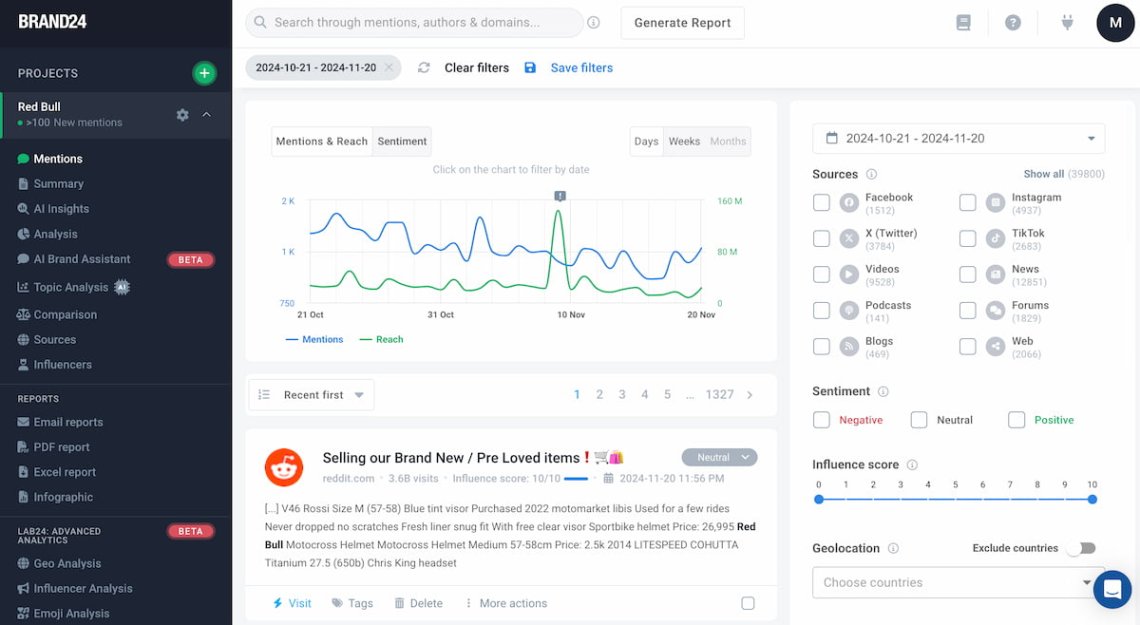
Comment vérifier la réputation de votre marque actuelle ?
- Analyser les sentiments
Le suivi du volume et de la portée de votre marque mention est intéressant, mais il ne suffit certainement pas à évaluer votre réputation actuelle.
Ce qui compte vraiment, ce sont les émotions qui poussent les gens à écrire sur votre marque. Et c'est là que les analyse des sentiments entre en scène !
Comme son nom l'indique, l'analyse des sentiments est une méthode qui consiste à analyser un texte pour en identifier l'intention.
Il vise à reconnaître automatiquement les sentiments cachés derrière les mots et les classer par catégories dans l'un des trois types suivants : positif, négatif et neutre.
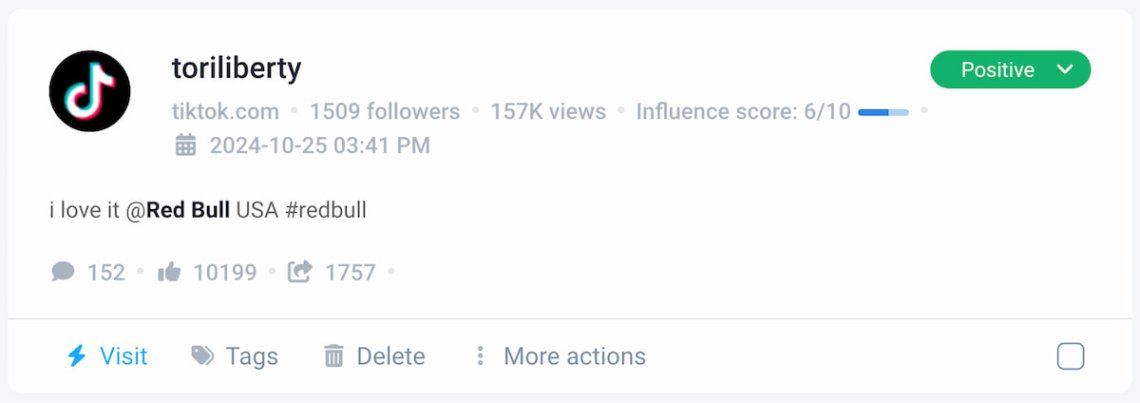
Vous pouvez analyser chaque mention un par un, mais cela prend beaucoup de temps - surtout si vous en avez des centaines, voire des milliers.
Heureusement, Brand24 présente tous vos mention dans un tableau intuitif. C'est très simple - si la ligne verte s'élève, le sentiment positif augmente ; si la ligne rouge s'élève, le sentiment négatif augmente.
Il suffit de regarder l'exemple ci-dessous :
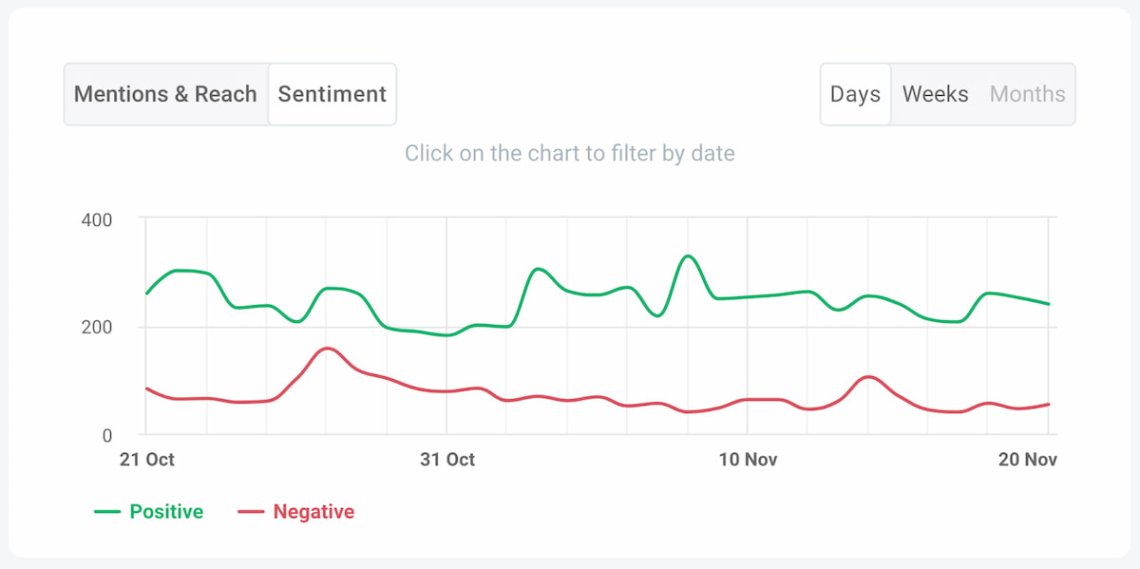
Il s'agit du graphique d'analyse du sentiment de Red Bull ci-dessous. La marque tire manifestement son épingle du jeu en termes de réputation !
Bonus : Lisez à propos de Comment faire de l'analyse des sentiments des clients par l'IA en 2025 [Un guide étape par étape].
- Vérifiez votre score de présence
La deuxième mesure pratique pour vérifier si vos efforts en matière de marketing de la réputation sont suffisants est la Score de présence.
Comme son nom l'indique, cette mesure indique la présence de votre marque en ligne. Plus le nombre de mention et la portée des mention de votre marque sont importants, plus votre score de présence est élevé.
Et comme vous l'avez peut-être deviné, l'amélioration de votre visibilité en ligne est essentielle à la réputation de votre entreprise.

Vérifiez votre analyse du sentiment et votre score de présence dès maintenant !
02 Fixer des objectifs clairs
Vous ne pouvez pas planifier une stratégie de marketing de la réputation sans fixer d'objectifs.
Déterminez donc ce que vous voulez atteindre !
Il peut s'agir de choses telles que
- Améliorer l'évaluation en ligne
- Augmenter le nombre d'avis positifs
- Améliorer la perception de la marque dans des domaines spécifiques
Le suivi de vos objectifs en matière de marketing de la réputation est essentiel, car il peut avoir un impact direct sur les performances de votre entreprise et vous aider à mesurer l'efficacité de votre stratégie.
Fixez vos objectifs de marketing de la réputation avec Brand24 !
D'accord, mais comment découvrir les domaines qui peuvent vous apporter le plus de retour sur investissement dans le cadre de votre marketing de réputation ?
Il y a des dizaines de conseils que je pourrais vous donner. Mais je vais simplifier les choses : demandez à l'IA !
Nous vivons à l'ère de l'intelligence artificielle. N'ayez donc pas peur de l'utiliser !
Cependant, au lieu de s'appuyer sur des chatbots génériques d'IA, se concentrer sur les outils d'IA spécialisés conçus pour le marketing de la réputation. Pourquoi ?
En effet, ces outils peuvent accéder à des données détaillées et spécifiques à la marque, ce qui leur permet de fournir des informations plus précises et mieux adaptées.
Par exemple, le Assistant de marque AI fonctionne comme ChatGPT mais accède aux données réelles de votre projet de surveillance des médias
J'ai posé une question : "Sur quoi Red Bull devrait-il se concentrer si la marque veut améliorer son marketing de la réputation ?".
En seulement 15 secondes, l'assistant de marque m'a donné 6 conseils pratiques pour améliorer les efforts de Red Bull en matière de marketing de la réputation.
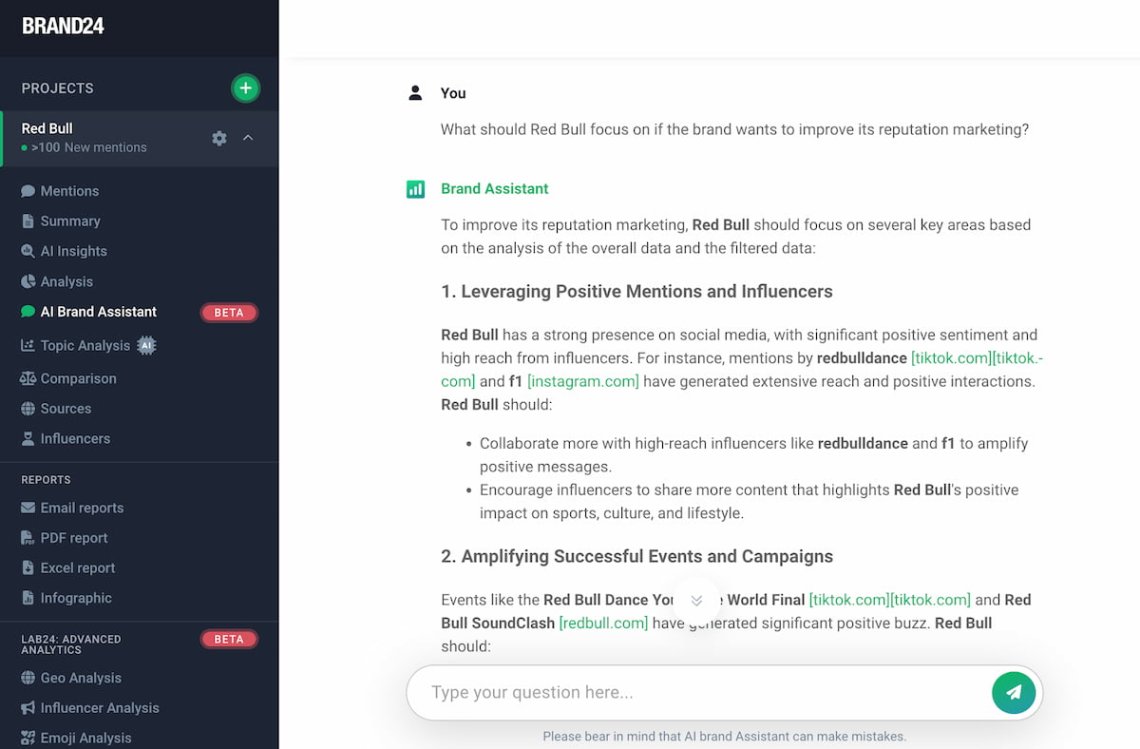
Chaque conseil est expliqué avec précision et étayé par des données.
Génial !
Accéder à l'assistant de marque AI !
03 Encourager les commentaires des clients
Les avis sont l'un des facteurs les plus importants pour améliorer la présence en ligne de votre marque. Ils vous informent sur la façon dont les gens perçoivent vos produits ou services.
En effet, selon la Étude BrightLocal50% des consommateurs font autant confiance aux avis en ligne qu'aux recommandations personnelles de leurs amis et de leur famille.
Les petites entreprises, en particulier, devraient s'efforcer d'encourager les clients satisfaits à rédiger des mention positives, car il n'y en a pas beaucoup en ligne pour l'instant.
C'est simple. Si votre marque n'est pas (encore) très connue, vos clients potentiels chercheront probablement à obtenir des avis sur votre entreprise en ligne.
En outre, les avis positifs de clients sur des plateformes d'évaluation tierces telles que Google Business Profile, Yelp et Trustpilot peuvent influencer de manière significative les décisions des clients potentiels, car ces plateformes sont considérées comme des sources plus crédibles et dignes de confiance.
Plus vous obtenez d'avis positifs, plus les gens sont susceptibles d'acheter vos produits.
Voyez comment les gens évaluent votre marque !
04 Amplifier le contenu positif de la marque
Selon le Hub de marketing d'influence72% des consommateurs considèrent les avis de clients et les témoignages plus crédibles que lorsqu'une entreprise ou une marque parle d'elle-même.
Qu'est-ce que cela signifie pour vous ?
Pour exploiter pleinement le potentiel des avis positifs, vous devez les mettre en valeur :
- Mettez en avant les témoignages et les avis positifs sur votre site web.
- Partagez-les dans vos publications sur les médias sociaux, vos bulletins d'information et autres supports de marketing.
- & amplifier leur portée et leur impact !
Voici un exemple concret d'un bon marketing de la réputation en ligne :
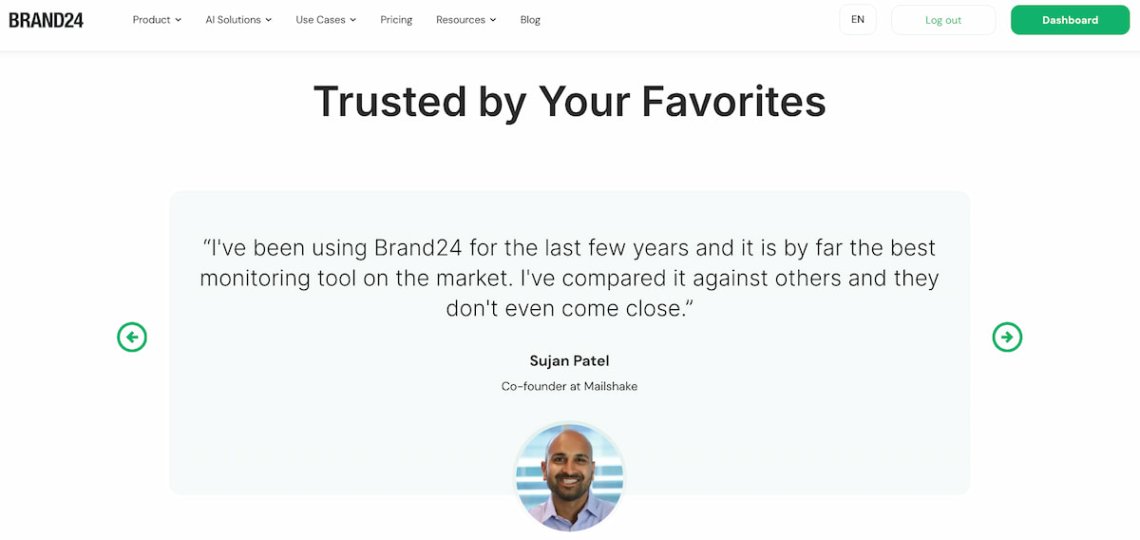
Mettez en valeur les études en créant des histoires ou des contenus convaincants autour de la réussite des clients.
Croyez-moi, cela fonctionne très bien, surtout dans le domaine du marketing B2B !
Ne vous arrêtez pas là et ajoutez des commentaires positifs à votre matériel de marketing sur les plateformes de médias sociaux.
Selon le l'étude "How Shopper Behavior is Changing" (Comment le comportement des acheteurs évolue)En effet, les annonces comportant des avis obtiennent des taux de clics quatre fois plus élevés et sont deux fois moins chères en termes de coût par acquisition et de coût par clic.
Essayez le meilleur outil de marketing de réputation !
05 Engagez-vous auprès de votre public
Il est extrêmement important de dialoguer avec les clients sur les plateformes de médias sociaux, les sites d'évaluation et les autres forums en ligne.
De nombreuses statistiques le prouvent !
Il suffit de mention que les marques qui s'engagent avec leurs clients sur les médias sociaux puissent réduire leur coût par contact de 83%
En d'autres termes, le fait de répondre aux réactions positives et négatives exprimées dans les avis, les commentaires et les messages montre qu'une marque accorde de l'importance à l'opinion de ses clients.
En fait, les clients attendent des entreprises qu'elles répondent rapidement aux commentaires positifs et négatifs, ce qui est essentiel pour un marketing de la réputation efficace.
En outre, être réactif ajoute à votre authenticité et montre qu'il y a de vraies personnes derrière la marque (surtout à l'heure où l'IA remplace les humains partout où c'est possible).
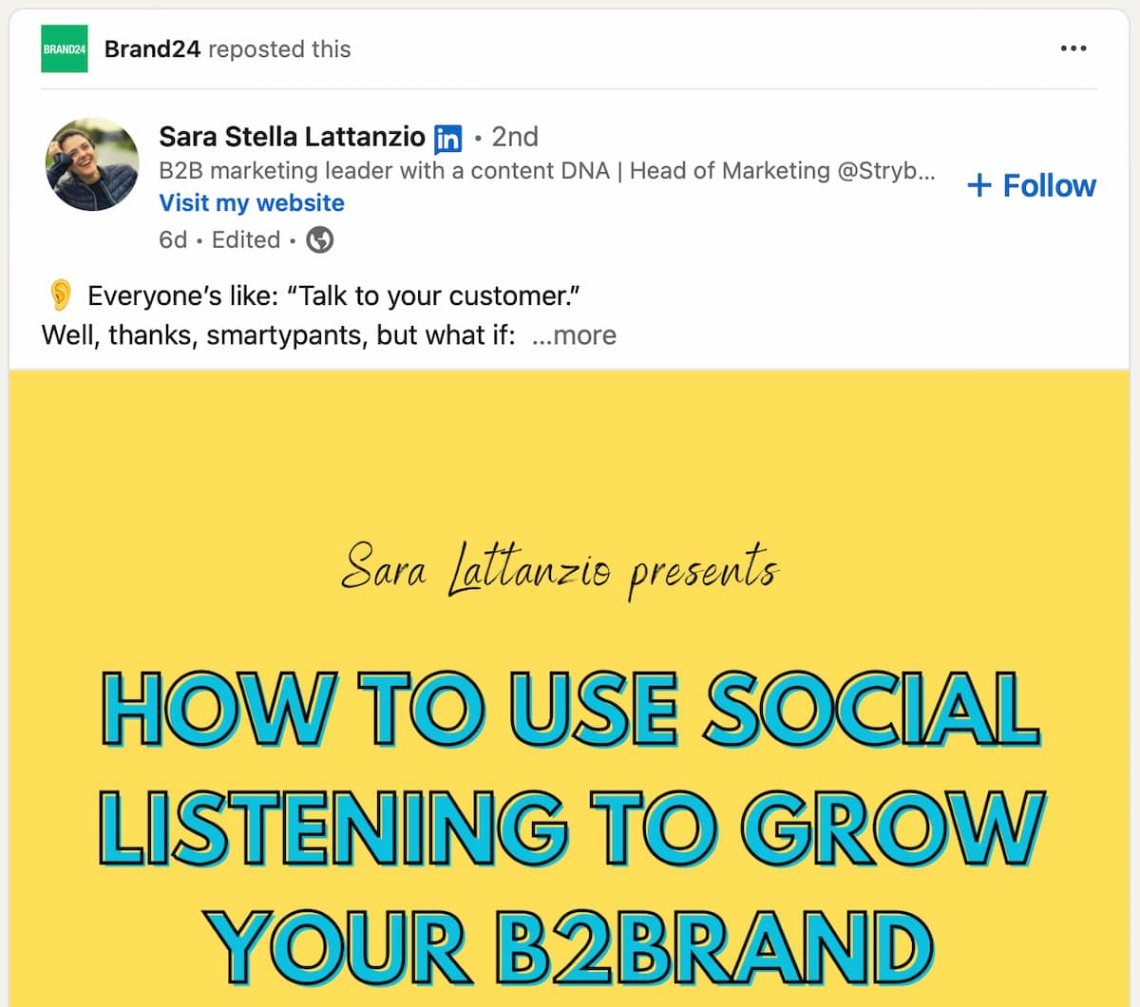
Félicitez toujours les personnes qui parlent positivement de vous sur les plateformes de médias sociaux !
Il n'y a rien de pire que de laisser un contenu généré par l'utilisateur sans surveillance.
Et il importe peu que l'avis recueilli soit positif ou négatif.
D'après l'étude de mentioned BrightLocal citée plus haut, 88% des clients sont susceptibles de faire appel à une entreprise en fonction de la façon dont elle réagit aux avis en ligne.
Améliorez votre marketing de la réputation avec Brand24 !
06 Traiter les commentaires négatifs de manière constructive
Les commentaires négatifs des clients ont deux facettes :
- Il peut s'agir d'une occasion d'améliorer votre produit ou service
- Cela peut également nuire à votre réputation.
C'est la façon dont vous gérez la situation qui compte le plus.
Voici quelques chiffres clés :
- 52% des clients attendent une réponse dans un délai d'une semaine;
- 96% des consommateurs recherchent spécifiquement des avis négatifs avant de décider de cliquer sur "Acheter".
Cela signifie deux choses.
Tout d'abord, vous devez répondre rapidement aux commentaires négatifs.
Deuxièmement, lorsque vous répondez, faites-le avec compréhension, excusez-vous si nécessaire et proposez une solution claire.
Cela permet non seulement de résoudre le problème, mais aussi de montrer à d'autres clients potentiels comment vous gérez les critiques.
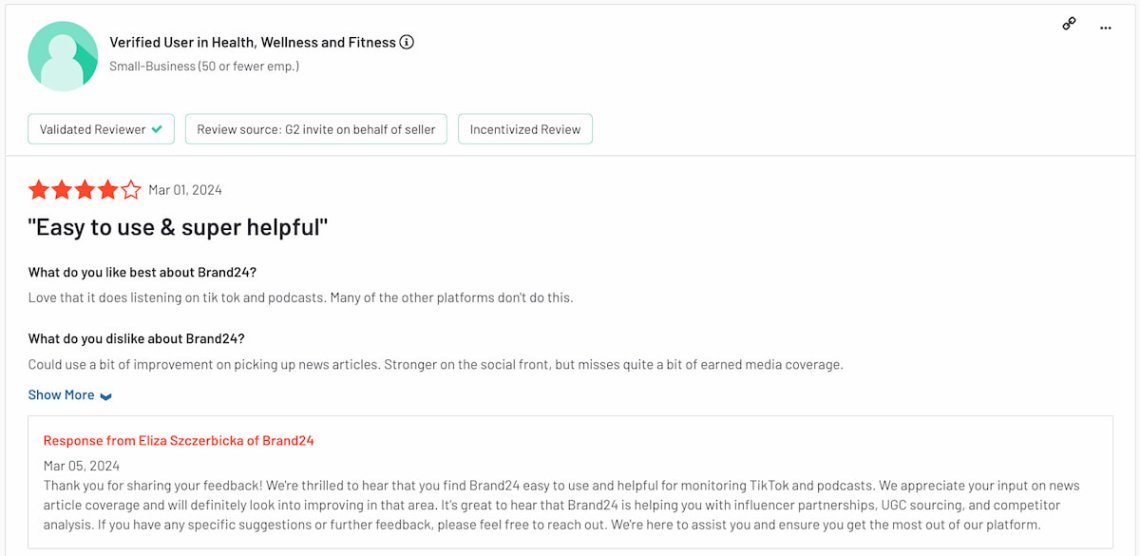
En outre, pour éviter les commentaires négatifs, vous pouvez tout simplement encourager les clients satisfaits à laisser des commentaires positifs et les mettre en avant dans votre marketing.
En fin de compte, rappelez-vous les mots de Warren Buffet : le retour d'information est un cadeau. Même s'il est négatif, il permet de construire une meilleure entreprise.
Si vous avez du mal à gérer les critiques négatives, consultez notre article : Comment répondre aux critiques négatives ?
07 Développez votre expertise de niche
Devenir un expert dans votre secteur d'activité donne un coup de fouet à votre réputation en ligne.
Lorsque les gens vous considèrent comme une autorité digne de confiance, ils sont plus enclins à le faire :
- Valorisez vos opinions
- Recommandez votre marque
- Acheter vos produits ou services
Pour développer une expertise de niche, vous devez partager régulièrement des informations précieuses.
Comment faire ?
1. Création de contenu
Votre site web est l'un des atouts les plus puissants de votre marque dans le cadre de vos efforts de marketing de la réputation.
Pourquoi ?
- Tout d'abord, vous en avez le contrôle total. Vous pouvez créer et diffuser du contenu mettant en avant les aspects positifs de la marque, ses valeurs, ses réalisations, son engagement dans la communauté et les réussites de ses clients.
- Deuxièmement, un contenu de haute qualité a le potentiel de devenir viral, ce qui renforce votre réputation.
- Troisièmement, la création d'un contenu de valeur et de qualité stimule votre optimisation pour les moteurs de recherche et visibilité de la marque dans les moteurs de recherche comme Google.
Si vos articles de blog apparaissent dans des pages de classement de moteurs de recherche compétitifs, cela prouve votre autorité dans votre niche et renforce la réputation en ligne de votre marque.
2. Webinaires
L'organisation de webinaires est un autre excellent moyen d'établir votre expertise de niche et d'améliorer votre réputation en ligne.
Pourquoi ?
- Les webinaires vous permettent de partager des connaissances approfondies directement avec votre public,
- Sensibilisez les gens à votre produit,
- Engagez-vous avec eux en temps réel,
- Présentez votre expertise d'une manière plus personnelle et interactive.
En offrant des informations précieuses et exploitables, vous renforcez votre réputation, instaurez un climat de confiance et favorisez les relations avec votre public.
En outre, vous pouvez inviter des experts du secteur ou des personnes influentes à co-animer vos webinaires.
Cela ajoute non seulement de la crédibilité à votre événement, mais élargit également votre portée lorsqu'ils vous partagent sur les médias sociaux.

En parlant de collaboration...
- Partenariats
Les partenariats peuvent également jouer un rôle crucial dans la gestion de la réputation.
Collaborer avec des influenceurs des médias sociaux, des leaders du secteur ou d'autres marques pour co-créer du contenu ou des initiatives susceptibles d'améliorer la réputation de la marque.
Veillez à ce que toutes les collaborations et tous les contenus reflètent et promeuvent les valeurs de votre marque afin d'instaurer la confiance et la cohérence.
Lorsqu'il est bien fait, marketing d'influence peut générer une forte reconnaissance positive sur les médias sociaux, amplifiant ainsi le contenu positif de la marque.
Essayez le meilleur outil de marketing de la réputation !
08 Former les employés
Croyez-le ou non, la formation de vos employés est essentielle au marketing de la réputation.
Vos employés peuvent être de puissants défenseurs de votre marque.
Encouragez-les à partager leurs expériences positives et leurs idées sur l'entreprise sur leurs réseaux personnels.
Des employés heureux sont un gage d'approbation de vos activités, et de bonnes image de marque de l'employeur peut également faire partie de vos efforts de marketing de la réputation.
Renforcez votre marketing de la réputation !
09 Élaborer un plan de gestion de crise
Enquête mondiale de PwC sur la crise et la résilience montre que 96% des organisations ont connu des perturbations ou des crises au cours de la période 2021 - 2023.
Il convient de souligner que 9 de ces crises sur 10 n'étaient pas liées à la pandémie.
En attendant, La recherche de TrustPilot montre qu'une réputation de marque positive est le facteur le plus important pour les consommateurs lorsqu'ils choisissent de s'engager avec une entreprise.
Ces statistiques montrent clairement une chose : la réputation de votre marque est essentielle... et les crises peuvent survenir à n'importe quel moment et pour n'importe qui.
C'est pourquoi le fait de disposer d'un communication de crise est essentiel.
Préparer un réputation de la marque gestion de crise afin de répondre efficacement aux menaces potentielles et d'assurer une réponse rapide et coordonnée en cas de problème.
Un logiciel de marketing de réputation peut être d'une grande aide à cet égard :
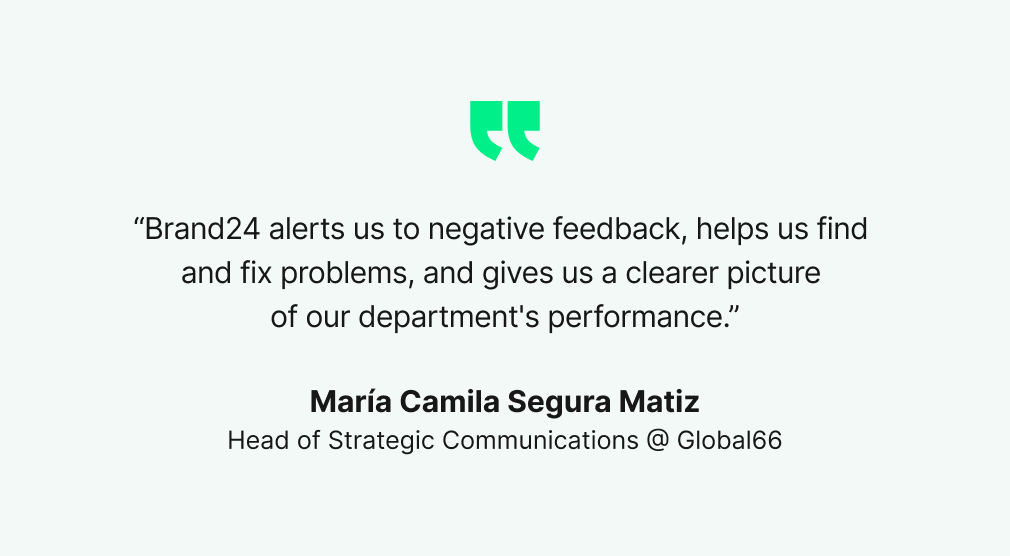
Vous pouvez lire l'histoire complète dans ce <strong>étude de cas</strong>.
Soyez prêts à faire face à une crise imminente !
10 Surveillez en permanence votre réputation en ligne
Le marketing de la réputation n'est pas un processus épisodique, mais un processus continu d'évaluations et d'améliorations.
Toute bonne stratégie doit être analysée et ajustée, car il s'agit d'un processus continu.
C'est pourquoi vous devez prendre l'habitude de surveiller votre réputation en ligne.
Un suivi régulier vous permet non seulement de répondre aux commentaires, mais joue également un rôle crucial dans le maintien et l'amélioration de l'image de votre marque sur les canaux numériques.
Vous pouvez utiliser un logiciel de marketing de la réputation tel que Brand24 pour mesurer les progrès accomplis dans la réalisation des objectifs et ajuster les tactiques si nécessaire.
D'accord, mais comment ?
Vous pouvez le faire manuellement en analysant votre sentiment (je l'ai décrit en détail dans la première étape).
Mais si vous avez besoin d'une approche plus automatisée et plus complète, utilisez la puissance de Aperçus sur l'IA.
En bref, il s'agit d'un onglet alimenté par l'IA qui présente les conclusions, les graphiques et les mesures les plus importants en un seul endroit.
En ce qui concerne la surveillance de votre réputation, vous devez accorder une attention particulière aux éléments suivants Tendances et Recommandations.
En pratique, vous pouvez utiliser des informations provenant de Tendances pour garder une longueur d'avance :
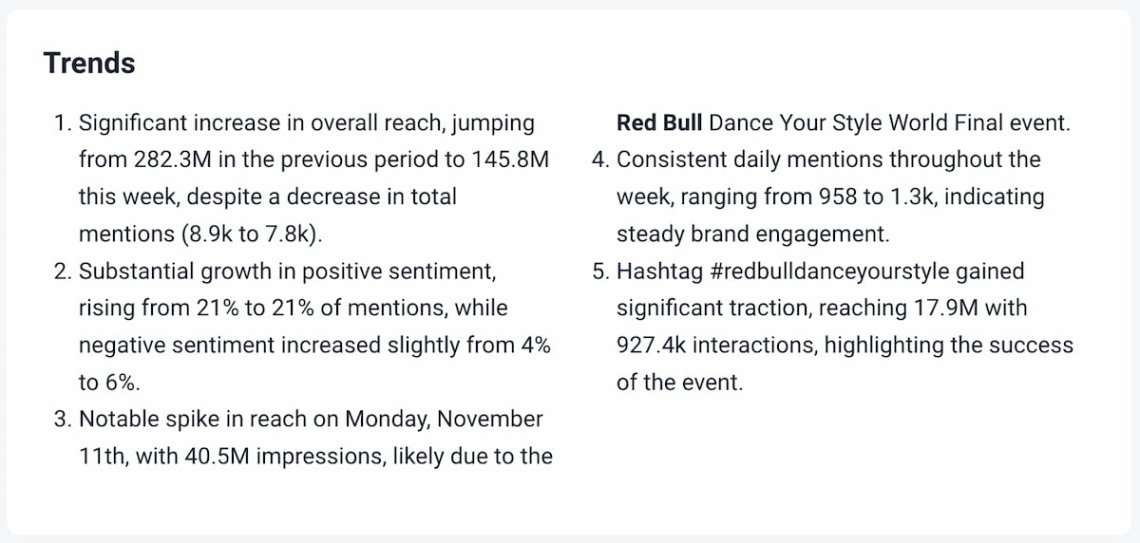
En ce qui concerne les RecommandationsIl s'agit de suggestions basées sur des données qui vous permettront d'améliorer votre réputation en renforçant vos campagnes existantes.
Utilisez-les à bon escient !
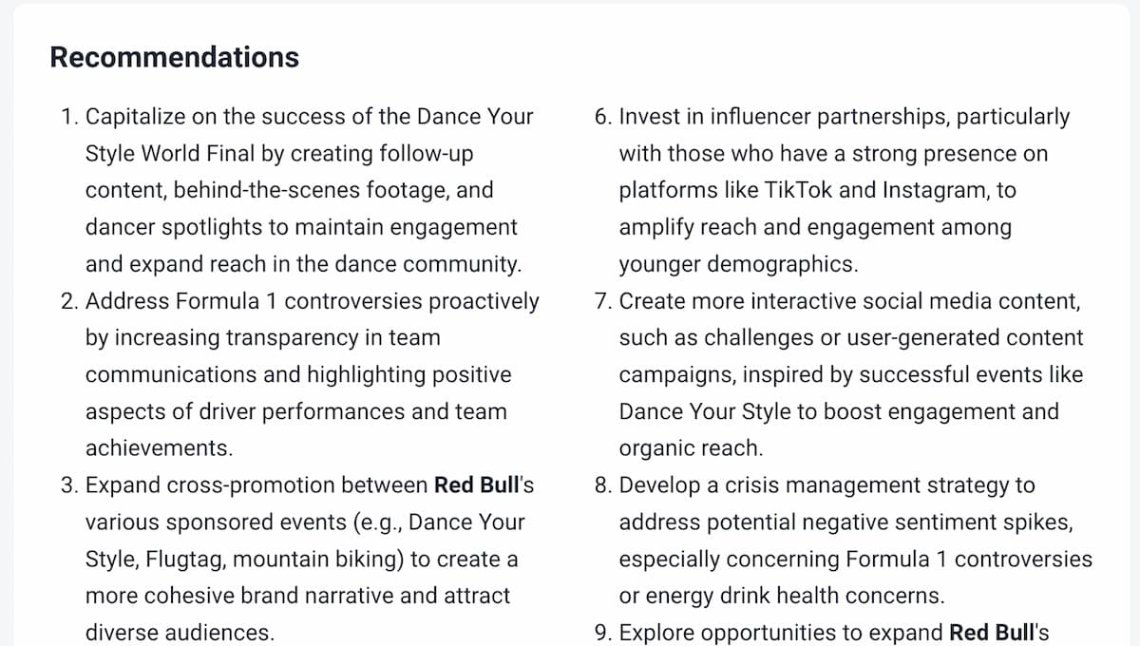
Utilisez la puissance de l'IA pour améliorer votre réputation !
Pourquoi le marketing de la réputation est-il important ?
Cette question peut paraître évidente, mais il existe d'autres facteurs que vous devriez intégrer dans votre stratégie d'entreprise en matière de gestion de la réputation.
Voici une liste des 10 raisons les plus importantes de mettre en place une stratégie de marketing de la réputation :
- Confiance et crédibilité. Une réputation positive établit la confiance. Les clients qui font confiance à une marque sont plus susceptibles d'acheter auprès d'elle, de lui rester fidèles et même de payer un supplément.
- Influencer les décisions d'achat. Les consommateurs font souvent des recherches sur les marques avant de prendre des décisions d'achat. Des avis positifs et une bonne réputation peuvent faire pencher les décisions en faveur d'une marque.
- Références de bouche à oreille. Une solide réputation stimule le marketing de bouche à oreille. Les clients satisfaits sont plus susceptibles de recommander la marque à d'autres personnes.
- Avantage concurrentiel: Sur des marchés saturés, une bonne réputation peut différencier une marque de ses concurrents et en faire un choix privilégié pour les consommateurs.
- Une plus grande fidélité des clients. Les marques jouissant d'une réputation positive bénéficient généralement d'une plus grande fidélité et d'une meilleure rétention de la part des clients.
- La résilience en cas de crise. Les marques jouissant d'une solide réputation sont mieux placées pour résister aux crises. Elles bénéficient souvent du bénéfice du doute et peuvent se rétablir plus rapidement.
- Avantages financiers. Une bonne réputation peut entraîner une augmentation des ventes et de la rentabilité. À l'inverse, une réputation entachée peut entraîner des pertes financières importantes.
- Attirer et retenir les talents. Les entreprises jouissant d'une bonne réputation ont plus de facilité à attirer et à conserver des employés qualifiés.
- Réduction des coûts de marketing. Le maintien d'une bonne réputation peut réduire les coûts de marketing et d'acquisition de clients, car le bouche-à-oreille positif et la confiance atténuent la nécessité de campagnes promotionnelles agressives.
- Relations avec les parties prenantes. Une réputation positive facilite l'établissement de meilleures relations avec les parties prenantes, notamment les partenaires, les fournisseurs et les investisseurs.
En résumé :
La réputation est un élément clé du marketing et des affaires. Elle sous-tend presque tous les aspects de l'interaction des consommateurs avec une marque et peut avoir un impact significatif sur le succès à long terme d'une entreprise.
Boostez votre marketing de réputation !
FAQ
Qu'est-ce que la stratégie de réputation ?
Une stratégie de marketing de la réputation fait référence à une approche planifiée et structurée visant à façonner et à maintenir la perception d'une marque, d'une entreprise ou d'un individu aux yeux de ses parties prenantes.
Cette stratégie est essentielle pour instaurer la confiance, gérer les crises, se différencier des concurrents et atteindre les objectifs commerciaux à long terme.
Surveillez votre réputation en ligne en temps réel !
Quelle est la différence entre le marketing et la gestion de la réputation ?
- La gestion de la réputation consiste à maintenir et à protéger l'image d'une marque.
- Le marketing de la réputation est différent, car il s'agit d'utiliser et d'améliorer cette image pour mieux atteindre les objectifs de marketing.
En pratique, alors que la gestion de la réputation se concentre sur le suivi et la réponse aux critiques, aux commentaires et aux mention afin de maintenir ou de réparer l'image d'une marque, le marketing de la réputation va plus loin.
Il promeut et amplifie activement les éléments de réputation positive afin de stimuler les efforts de marketing.
Vous pourriez également être intéressé par : 6 conseils d'experts pour maîtriser la gestion de la réputation de la marque
Qu'est-ce qu'un exemple de réputation ?
La "réputation" désigne la perception ou l'évaluation collective d'une marque, d'une entreprise, d'une personne ou d'une entité sur la base d'actions, de comportements ou de performances antérieurs.
Voici quelques exemples pour illustrer la réputation :
- Apple est connu pour son approche centrée sur le design et ses produits conviviaux. L'entreprise a la réputation de produire des appareils technologiques innovants et de haute qualité.
- D'autre part, Volkswagen a vu sa réputation entachée par le scandale du "Dieselgate", lorsqu'il a été découvert qu'il manipulait les tests d'émission.
Bien qu'ils aient pris des mesures pour se rétablir, l'incident a laissé une marque sur leur réputation pendant un certain temps.
Prévenir une crise de relations publiques !
Qu'est-ce que la réputation d'une marque ?
La réputation de la marque, souvent appelée simplement réputation de la marqueLa marque est la perception et l'impression collective que les consommateurs et les autres parties prenantes ont d'une marque.
Elle est basée sur leurs expériences, leurs interactions et leur exposition aux messages, aux actions, aux produits et aux services de la marque au fil du temps.
Il s'agit de l'intersection des efforts d'une entreprise en matière de stratégie de marque (comment elle veut être perçue) et des opinions et sentiments réels des gens à l'égard de l'entreprise.
Renforcez votre marketing de la réputation !
Conclusion
C'est plus qu'une simple stratégie. Le marketing de la réputation permet d'instaurer la confiance, d'attirer les clients et d'assurer la réussite à long terme des entreprises.
Écoute sociale outils comme le Brand24 vous permettent d'anticiper les problèmes potentiels et de maximiser vos efforts.
Vous devez accepter le fait que les crises sont presque inévitables.
Mais avec un plan de communication de crise bien pensé et une approche proactive, vous pouvez transformer les défis en opportunités de croissance.
En accordant la priorité à votre réputation et en l'intégrant à votre stratégie marketing globale, vous pouvez créer une impression positive durable qui suscite la confiance, inspire la fidélité des clients et vous permet de vous développer.
Principaux enseignements :
- Le marketing de la réputation n'est pas un effort ponctuel mais un processus continu. Elle nécessite une approche stratégique et un suivi régulier.
- Même les commentaires négatifs peuvent être un cadeau - Il fournit des informations précieuses pour améliorer et renforcer votre entreprise ainsi que pour améliorer votre notoriété de la marque.
- Présenter des exemples de réussite et des études de cas pour mettre en évidence les résultats du monde réel, instaurer la confiance et fournir des résultats concrets.
- Utiliser des outils d'IA comme Brand24 pour évaluer votre réputation actuelle et contrôler vos efforts de marketing de la réputation.
Démarrer l'essai gratuit de 14 jours de Brand24 maintenant et améliorez votre stratégie de marketing de la réputation !






